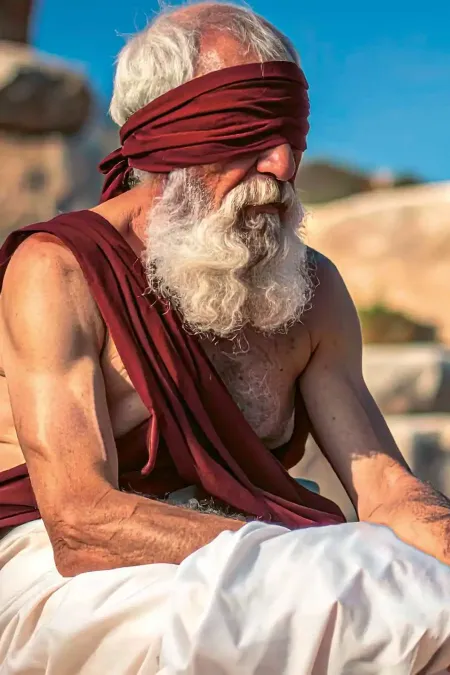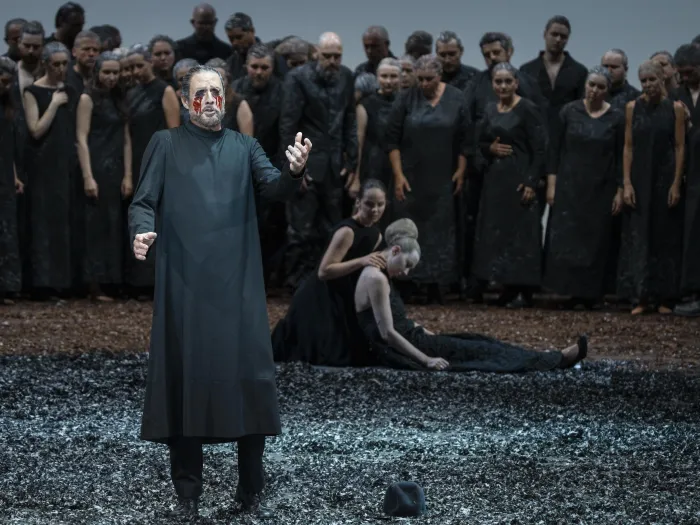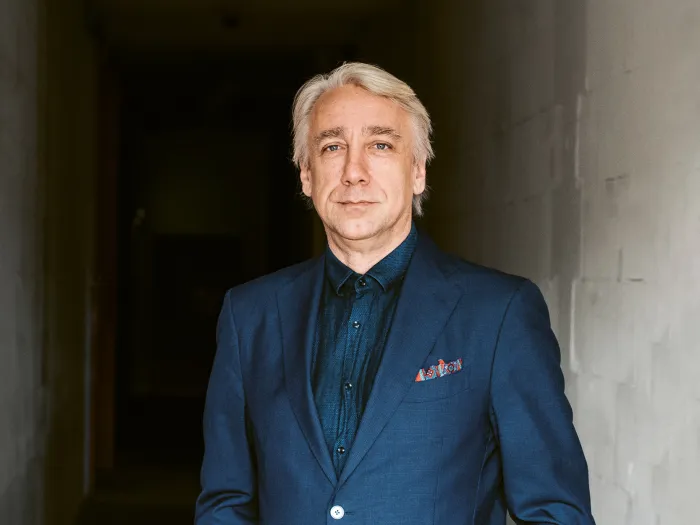Interview by Viola Bierich and Lena Flauger – with themselves and ChatGPT.
The text was published in edition 3 (06/25).
Reading time 4 Min.
“I Was a Puppet in the Gods’ Game”
Imagine this: Oedipus, the legendary king of myth and tragedy, sits opposite us. After years of silence, he is ready to speak about a life marked by riddles, guilt, and an inescapable fate.
A fictional interview about guilt, realization, and redemption – inspired by the libretto of George Enescu’s opera Œdipe.
King Oedipus, your story is marked by dramatic twists and inescapable circumstances. Looking back after so many years, how do you reflect on your adverse fate? In the end, was acceptance your only option?
Oedipus: That’s the question, isn’t it? All my life, I tried to escape what the gods had foretold for me. But just as a river inevitably finds its way to the sea, I always returned to my fate. As a young man I fled Corinth, the home of Polybus, whom I believed to be my father, thinking that distance would shield me from doom. But my choice led me directly to the place where destiny fulfilled itself. The prophecy – that I would kill my father and marry my mother – was a burden I could never shake...
Many admire your intellect and inner strength. Bravely you confronted the Sphinx, who had terrorized the city Thebes – and you defeated her. Did you feel then that you were in control of your life?
Yes. When I defeated the Sphinx, I felt invincible. Her riddle – "What is greater than fate?" – seemed absurdly easy to answer. I confidently replied: “Man is stronger than fate.” (That is the version of the riddle from the opera Œdipe. In the myth, the riddle goes: “What walks on four legs in the morning, two at noon, and three in the evening?” – “Man.”) Today I know: the answer was right, but I misunderstood it. Perhaps my triumph made me reckless and blind...
I was young, intelligent, strong. I had the answer no one else did. I defeated the Sphinx not with a sword, but with my belief in human freedom, in the possibility of defying a predetermined path. That’s how I saved the city. The people cheered; they called me their liberator. And I – I believed them. I believed I had conquered fate. But in truth, I had run straight into its arms. I married Jocasta. I loved her deeply. We had four children... I was happy.

But that happiness was fleeting. What happened to you when you realized the prophecy had already come true?
That was the worst moment of my life. I was blind long before I took my own sight. I had killed King Laius –my father, whom I believed to be a stranger – during a fight at a crossroad, in a moment of rage. Later, I married Jocasta, Queen of Thebes. I loved her without knowing who she truly was. When I learned that she was my mother and Laius my father... I lost the ground beneath my feet. I thought I had control, but I was merely a puppet in the gods’ game. Admitting that was perhaps too painful for a long time – but eventually, I had to face the truth. I could no longer run from myself.
You blinded yourself when the truth came to light. Why?
Because I couldn’t bear to see the light after recognizing the darkness within me. Eyes are useless when the mind is blind. It was my guilt, my crime. My mother and wife, Jocasta, took her own life because she couldn’t bear the truth. This terrible fate weighed not only on me but also on her. Afterward, I could no longer rule as king or walk among people without shame. Years later, I am just a shadow. An old, blind man wandering from place to place. My daughter Antigone guides me. She is my light. I speak to no one. I ask nothing more from life. But deep within me, something is beginning to grow. Not comfort – more like a different kind of understanding.
Some see you as a victim of fate, others as someone who must answer for his actions. Looking back on your life – what remains?
The realization that I am human. Nothing more, nothing less. A man who loved and hated, who helped others, but also caused great harm. Fate set the stage, but I made the moves. The gods may have paved the way, but it was my anger, my pride, my sense of justice – and my blindness – that drove me forward.
When I answered the Sphinx’s riddle, I gave the right answer, but I didn’t truly understand it. Back then, I believed man was stronger than fate because he could outwit it, escape it. Today, I know: we cannot escape responsibility. We can only try to carry it. Perhaps that is the greatest wisdom.
After everything you’ve been through, you don’t seem consumed by despair, but rather as if you’ve found inner peace...
Perhaps it’s not peace in the classical sense. No comfort, no reconciliation with what happened. But I’ve stopped running – from myself, from the truth, from the pain. Being blind is what allows me to see more clearly. It’s no longer heroism that carries me, no belief in greatness or significance. It’s something simpler – perhaps deeper: That we confront life and our actions. That we keep going, even when nothing is easy. In acknowledging, in enduring – there may lie the most human thing of all.
Just before going to press, we were informed that Johan Reuter, who was scheduled to appear in this interview, has had to withdraw from the title role of Œdipe for personal reasons. Paul Gay will now take over the part. Still, we asked ourselves: Who is King Oedipus? And invited him – fictionally – for a conversation.




